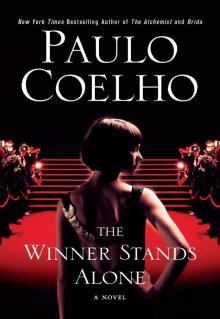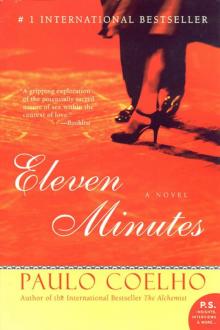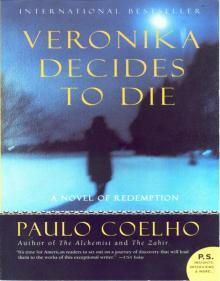- Home
- Paulo Coelho
The Winner Stands Alone Page 4
The Winner Stands Alone Read online
Page 4
Her first line was: "Your hair wants cutting." Then Alice would reply: "You should learn not to make personal remarks, it's very rude."
When the long-awaited moment came, a moment she had rehearsed and rehearsed, she was so nervous that she got the line wrong and said instead: "Your hair wants washing." The girl playing Alice said her next line anyway, and the audience would never have noticed anything was wrong if Gabriela, who knew she had made a mistake, hadn't promptly lost the power of speech. Since the Mad Hatter was an essential character if the scene was to continue, and since children are not good at improvising on stage (although they improvise happily enough in real life), no one knew what to do. Then, after several long minutes, during which the actors simply looked at each other, the teacher started applauding, announced it was time for an interval, and ordered everyone offstage.
Gabriela not only left the stage, she left the school in tears. The following day, she found out that the scene with the Mad Hatter had been cut, and the actors would instead move straight on to the game of croquet with the Queen. The teacher said this didn't matter in the least because the story of Alice in Wonderland is a lot of nonsense anyway, but during playtime, the other girls and boys ganged up on Gabriela and started beating her.
This wasn't so very unusual--it was a fairly regular occurrence--and she had learned to defend herself as energetically as when she, in turn, attacked the weaker children. On this occasion, however, she took the beating without uttering a word and without shedding a tear. Her reaction was so surprising that the fight lasted almost no time at all; her schoolmates expected her to scream and shout, and, when she didn't, rapidly lost interest. For with each blow, Gabriela was thinking:
"I'll be a great actress one day and then you'll be sorry."
Who says that children aren't capable of deciding what they want to do in life?
Adults do.
And when we grow to be adults ourselves, we believe that we really are wise beings who are always right. Many children had doubtless been through a similar experience, playing the role of the Mad Hatter or Sleeping Beauty or Aladdin or Alice, and decided there and then to abandon the spotlights and the applause. Gabriela, though, had never before lost a battle; she was the prettiest and most intelligent student in school and always got the best marks in class; and she knew intuitively that if she didn't fight back at once, she would be lost.
It was one thing to get a beating from her schoolmates--because she could give as good as she got--but it was quite another to carry a failure like that around with her for the rest of her life. As we all know, a fluffed line in a school play, an inability to dance as well as everyone else, or rude comments passed about skinny legs or a big head--which all children have to put up with--can have two radically different consequences.
Some people opt for revenge and try to be really good at whatever it is the others thought they couldn't do. "One day, you'll envy me," they think.
Most people, however, accept their limitations, and then things tend to go from bad to worse. They grow up insecure and obedient (although they dream of a day when they'll be free and able to do whatever they want), they get married to prove that they're not as ugly as other kids said they were (although deep down they still believe they are), they have children so that no one can say they're infertile (even though they never wanted kids anyway), they dress well so that no one can say they dress badly (although they know people will say that anyway).
By the following week, the incident at the play had been forgotten by everyone at school, but Gabriela had decided that, one day, when she was a world-famous actress, accompanied by secretaries, bodyguards, photographers, and legions of fans, she would go back to that school. She would put on a performance of Alice in Wonderland for needy children, she would make the news, and her childhood friends would say:
"I was on the same stage as her once!"
Her mother wanted her to study chemical engineering, and as soon as she finished high school, her parents sent her to the Illinois Institute of Technology. During the day, she studied protein paths and the structure of benzene, but she spent her evenings with Ibsen, Coward, and Shakespeare while attending a drama course paid for with money sent to her by her parents to buy clothes and course books. She trained with the best professionals and had excellent teachers. She received good reviews and letters of recommendation, she performed (without her parents' knowledge) as a backup singer for a rock group and as a belly dancer in a play about Lawrence of Arabia. It was always a good idea to accept any role that came along. There was always the chance that someone important might be in the audience, someone who would invite her to her first real audition, and then all those testing times and all her struggles to gain a place in the spotlight would be over.
The years passed. Gabriela made TV commercials, toothpaste ads, did some modeling work, and was even tempted to respond to an invitation from a group that specialized in providing escorts for businessmen because she desperately needed money to put together a proper portfolio to send to all the major modeling and acting agencies in the United States. Fortunately, God--in whom she never lost faith--saved her. That same day, she was offered a job as an extra in a video of a Japanese singer, which was going to be filmed beneath the viaduct of the Chicago El. She was paid much more than she expected (apparently the producers had demanded a fortune in fees for the foreign cast), and with that extra money she managed to produce the vital book of photos (or "book," as it's known in every language in the world), which also cost much more than she had imagined.
She was always telling herself that she was just at the beginning of her career, even though the days and months were beginning to fly by. She might have been picked to play Ophelia in Hamlet while she was in the drama course, but life mostly offered her only ads for deodorants and beauty creams. Whenever she went to an agency to show them her book and the letters of recommendation from teachers, friends, and colleagues, she found the waiting room full of girls who looked very like her, all of them smiling, all of them hating each other, and all doing whatever they could to get something, anything, that would give them "visibility," as the professionals called it.
She would wait hours for her turn to come, and meanwhile read books on meditation and positive thinking. She would end up sitting opposite someone--male or female--who ignored the letters and went straight to the photos, not that they ever commented on those either. They would make a note of her name. Sometimes, she would be called in for an audition, about one in ten of which bore fruit. There she would be again, with all her talent (or so she thought), standing in front of a camera and a lot of ill-mannered people, who were always telling her: "Relax, smile, turn to the right, drop your chin a little, lick your lips." And the result: a photo of a new brand of coffee.
And what happened when she wasn't called? She felt rejected, but soon learned to live with that and come to see it as a necessary experience, a test of her perseverance and faith. She refused to accept the fact that the drama course, the letters of recommendation, the CV listing minor roles performed in minor theaters, were of no use at all...
Her mobile phone rang....none at all.
It continued to ring.
She was still traveling back in time as she gazed out at the tobacconist's and at the little girl eating chocolate, then she finally emerged from her reverie, realized what was happening, and answered the phone.
A voice at the other end was saying that she had an audition in two hours' time.
She had an audition!
In Cannes!
So it had been worth crossing the ocean, arriving in a city where all the hotels were full, meeting up at the airport with other young women in exactly the same position as she (a Pole, two Russians, and a Brazilian), and going round knocking on doors until they found that shared, exorbitantly priced apartment. After all those years of trying her luck in Chicago and traveling now and then to Los Angeles in search of more agents, more advertisements, more rejections, it turned ou
t that her future lay in Europe!
In two hours' time?
She couldn't catch a bus because she didn't know the routes. She was staying high up on a steep hill and had only been down it twice so far--to distribute copies of her book and to go to that stupid party last night. On both occasions, when she reached the bottom of the hill, she had hitched a lift from complete strangers, usually single men in magnificent convertibles. Everyone knew Cannes to be a safe place, and all women know that good looks help when trying to get a ride, but she couldn't leave anything to chance this time, she would have to resolve the problem herself. Auditions follow a rigorous timetable, that was one of the first things you learn at any acting agency. She had noticed on her first day in Cannes that the traffic was almost permanently gridlocked, and so all she could do was get dressed and leave at once. She would be there in an hour and a half; she remembered the hotel where the producer was staying because it was on the "pilgrimage route" she had followed yesterday, in search of some opportunity, some opening.
Now the problem was what to wear.
She fell upon the suitcase she had brought with her, chose some Armani jeans made in China and bought on the black market in Chicago for a fifth of the real price. No one could say they were fake because they weren't: everyone knew that the Chinese manufacturers sent eighty percent of what they produced to the original stores, with the remaining twenty percent being sold off by employees on the side. It was, shall we say, excess stock, surplus to requirements.
She was wearing a white DKNY T-shirt, which had cost more than the jeans. Faithful to her principles, she knew that the more discreet the clothes, the better. No short skirts, no plunging necklines, because if other women had been invited to the audition, that is what they would be wearing.
She wasn't sure about her makeup. In the end, she opted for a very light foundation and an even lighter application of lip liner. She had already lost a precious fifteen minutes.
11:45 A.M.
People are never satisfied. If they have a little, they want more. If they have a lot, they want still more. Once they have more, they wish they could be happy with little, but are incapable of making the slightest effort in that direction.
Is it just that they don't understand how simple happiness is? What can she want, that girl in the jeans and white T-shirt who just came running past? What could be so urgent that it stopped her taking time to contemplate the lovely sunny day, the blue sea, the babies in their strollers, the palms fringing the beach?
"Don't run, child! You'll never escape the two most important presences in the life of any human being: God and death. God accompanies your every step and will be annoyed because he can see that you're not paying attention to the miracle of life. Or indeed death. You just ran past a corpse and didn't even notice."
Igor has walked past the scene of the crime several times now. At one point, he realized that his comings and goings might arouse suspicion and so decided to remain a prudent two hundred yards from the scene, leaning on the balustrade that looked out over the beach. He's wearing dark glasses, but there's nothing suspicious about that, not only because it's a sunny day, but because in a celebrity town like Cannes, dark glasses are synonymous with status.
He's surprised to see that it's almost midday, and yet no one has realized that there's a person lying dead on the main street of a city which, at this time of year, is the focus of the world's attention.
A couple are approaching the bench now, visibly irritated. They start shouting at the sleeping beauty; they're the girl's parents, angry because she isn't working. The man shakes her almost violently. Then the woman bends over, obscuring Igor's field of vision.
Igor knows what will happen next.
The mother screams. The father takes his mobile phone from his pocket and moves away, clearly agitated. The mother is shaking her daughter's unresponsive body. Passersby stop, and now he can remove his dark glasses and join them as one more curious onlooker.
The mother is crying, clinging to her daughter. A young man gently pushes her away and attempts mouth-to-mouth resuscitation, but soon gives up; Olivia's face already has a slight purple tinge to it.
"Someone call an ambulance!"
Several people dial the same number, all of them feeling useful, important, caring. He can already hear the sound of the siren in the distance. The mother's screams are growing louder. A young woman tries to put a comforting arm around her, but the mother pushes her away. Someone attempts to sit the body up, and someone else tells them to lay her down again because it's too late to do anything.
"It's probably a drug overdose," the person next to him says. "Young people today are a lost cause."
Those who hear the comment nod sagely. Igor remains impassive while he watches the paramedics unload their equipment from the ambulance, apply electric shocks to Olivia's heart, while a more experienced doctor stands by, not saying a word, because although he knows there's nothing to be done, he doesn't want his colleagues to be accused of negligence. They place Olivia's body on the stretcher and put it in the ambulance, the mother still clinging to her daughter. After a brief discussion, they allow the mother to get in too, and the ambulance speeds away.
No more than five minutes have passed between the couple discovering the body and the ambulance leaving. The father is still standing there, stunned, not knowing where to go or what to do. Forgetting whom he's speaking to, the same person who made the comment about a drug overdose goes over to the father and gives him his version of the facts:
"Don't worry, sir. This kind of thing happens every day around here."
The father does not respond. He's stilling holding his mobile phone and staring into space. He either doesn't understand the remark or has no idea what it is that happens every day, or else he's in a state of shock that has sent him immediately into some unknown dimension where pain does not exist.
The crowd disperses as quickly as it appeared. Only two people remain: the father still clutching his phone and the man who has now taken off his dark glasses and is holding them in his hand.
"Did you know the girl?" Igor asks.
There is no reply.
It's best to do as everyone else has done, keep walking along the Boulevard de la Croisette and see what else is happening on this sunny morning in Cannes. Like the girl's father, he doesn't know quite what he is feeling: he has destroyed a world he will never be able to rebuild, even if he had all the power in the world. Did Ewa deserve that? From the womb of that young woman, Olivia--the fact that he knows her name troubles him greatly because that means she's no longer just a face in the crowd--might have sprung a genius who would have gone on to discover a cure for cancer or drafted an agreement that would ensure that the world could finally live in peace. He has destroyed not just one person, but all the future generations that might have sprung from her. What has he done? Was love, however great and however intense, sufficient justification for that?
He had chosen the wrong person as his first victim. Her death will never make the news and Ewa won't understand the message.
Don't think about it, it's done now. You have prepared yourself to go much further than this, so carry on. The girl will understand that her death was not in vain, but was a sacrifice in the name of a greater love. Look around you, see what's happening in the city, behave like a normal citizen. You've already had your fair share of suffering in this life; now you deserve a little peace and comfort.
Enjoy the Festival. This is what you have been preparing yourself for.
EVEN IF HE'D HAD HIS swimming things with him, he would have found it difficult to get anywhere near the seashore. The big hotels had, it seems, acquired the rights to great swaths of beach which they had filled with their chairs, logos, waiters, and bodyguards, who, at every entry point, demanded the guest's room key or some other form of identification. Other areas were occupied by huge white tents, where some production company, brewery, or cosmetics firm was launching its latest product at a so-called l
unch. People here were dressed normally, if by "normal" you mean a baseball cap, bright shirt, and light-colored trousers for men, and jewelry, loose top, Bermudas, and low-heeled shoes for women.
Dark glasses were de rigueur for both sexes, and there was little bare flesh on show because members of the Superclass were too old for that now, and any such display would be considered ridiculous or, rather, pathetic.
Igor noticed one other thing: the mobile phone. The most important item of clothing.
It was essential to be receiving a constant stream of messages or calls, to be prepared to interrupt any conversation in order to answer a call that was not in the least urgent, to stand keying in endless texts via an SMS. They had all forgotten that these initials mean Short Message Service and instead used the keypad as if it were a typewriter. It was slow, awkward, and could cause serious damage to the thumb, but what did it matter? At that very moment, not only in Cannes, but in the whole world, the ether was being filled with messages like "Good morning, my love, I woke up thinking about you and I'm so glad to have you in my life," "I'll be home in ten minutes, please have my lunch ready and check that my clothes were sent to the laundry," or "The party here is a real drag, but I haven't got anywhere else to go, where are you?" Things that take five minutes to be written down and only ten seconds to be spoken, but that's the way the world is. Igor knows all about this because he has earned hundreds of millions of dollars thanks to the fact that the phone is no longer simply a method of communicating with others, but a thread of hope, a way of believing that you're not alone, a way of showing others how important you are.
And it was leading the world into a state of utter madness. For a mere five euros a month, via an ingenious system created in London, a call center would send you a standard message every three minutes. When you know you're going to be talking to someone you want to impress, you just have to dial a particular number to activate the system. The phone rings, you pick it up, open the message, read it quickly, and say "Oh, that can wait" (of course it can: it was written to order). This way, the person you're talking to feels important, and things move along more quickly because he realizes he's in the presence of a very busy person. Three minutes later, the conversation is interrupted by another message, the pressure mounts, and the user of the service can decide whether it's worth turning off his phone for a quarter of an hour or lying and saying that he really must take this call, and so rid himself of a disagreeable companion.

 The Alchemist
The Alchemist Maktub
Maktub Like the Flowing River
Like the Flowing River The Winner Stands Alone
The Winner Stands Alone The Spy
The Spy By the River Piedra I Sat Down and Wept: A Novel of Forgiveness
By the River Piedra I Sat Down and Wept: A Novel of Forgiveness Eleven Minutes
Eleven Minutes Manuscript Found in Accra
Manuscript Found in Accra Warrior of the Light
Warrior of the Light Veronika Decides to Die: A Novel of Redemption
Veronika Decides to Die: A Novel of Redemption The Devil and Miss Prym: A Novel of Temptation
The Devil and Miss Prym: A Novel of Temptation The Valkyries: An Encounter With Angels
The Valkyries: An Encounter With Angels Brida: A Novel
Brida: A Novel Fifth Mountain: A Novel
Fifth Mountain: A Novel Adultery
Adultery Inspirations
Inspirations The Archer
The Archer The Witch of Portobello
The Witch of Portobello The Pilgrimage
The Pilgrimage The Zahir
The Zahir Brida
Brida The Fifth Mountain
The Fifth Mountain Like the Flowing River: Thoughts and Reflections
Like the Flowing River: Thoughts and Reflections Manual of the Warrior of Light
Manual of the Warrior of Light By The River Piedra I Sat Down & Wept
By The River Piedra I Sat Down & Wept The Supreme Gift
The Supreme Gift Aleph
Aleph Hippie
Hippie Witch of Portobello
Witch of Portobello The Devil and Miss Prym
The Devil and Miss Prym The Alchemist - 10th Anniversary Edition
The Alchemist - 10th Anniversary Edition The Valkyries
The Valkyries